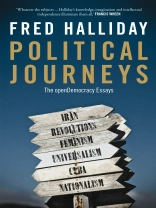Fred Halliday always combined the broad sweep of modern history, its currents and ideas, with a profound knowledge of modern revolutions, the Middle East and national movements. This collection of columns written for open Democracy between 2004 and 2009 is proof of a subtle worldview that continues to generate questions: what is the relation between religion, nationalism and progress? Is a new international order possible? When is intervention a force for progress? From the big headline topics like the Iraq war or the Danish cartoons, to the unexpected comparisons, of Tibet and Palestine or Afghanistan and the Falklands, Halliday is a perennially surprising and enlightening guide to the major issues of international politics.
Cuprins
Contents: Introduction by Stephen Howe 9 Preface 19 One: Points of Departure 1. Lessons from Ireland 21 2. 1968: The Global Legacy 26 3. What was Communism? 31 4. A Lunch with Mario Soares 36 5. The Forward March of Women Halted? 40 6. Feminism in the Middle East: Two Pioneers 45 Two: Shadows of Cold War 1. The Age of the Three Dustbins 49 2. Looking Back on Saddam Hussein 54 3. Cold War Assassinations: Solved and Unsolved 62 4. A Conversation in Havana 66 5. Boadicea in the South Atlantic: The Legacies of Margaret Thatcher 73 6. The Vagaries of ‘Anti-Imperalism’: The Left and Jihad 77 7. The Dominican Republic: In Search of a ‘National Hero’ 83 Three: Challenges of the Middle East 1. Crises of the Middle East: 1914, 1967, 2003 89 2. America and the Arab World after Saddam 94 3. Al Jazeera: A Matchbox that Roared 116 4. Yemen: Murder in Arabia Felix 122 5. Navigating Mare Nostrum: The Barcelona Process after Ten Years 128 6. In an Unholy Place: Letter from Jerusalem 132 7. Lebanon, Israel and the ‘Greater Western Asian Crisis’ 136 8. Maxime Rodinson: In Praise of a ‘Marginal Man’ 140 Four: Iran: Revolution in a ‘Great Nation’ 1. Ahmadinejad as President: Iran’s Revolutionary Spasm 147 2. Miscalculations in Tehran 151 3. Sunni, Shi’a and the ‘Trotskyists of Islam’ 156 4. Iran’s Revolution in Global History 161 5. Reflections on the Counter-Revolution in Iran 167 Five: Violence and Politics 1. Terrorism in Historical Perspective 171 2. A Commemoration in Atocha Station 181 3. A Visit to ‘Ground Zero’ 185 4. Two Days with Hizbullah 189 5. Reason amid Rockets: Moral Judgement in Time of War 196 6. The Attorney General Comes to Town 202 Six: Profane Agenda: Politics and Profit in the Lands of Islam 1. A Transnational Umma: Reality or Myth? 209 2. Faith as Business: Islam, Law and Finance 213 3. Finance in the Gulf: The Chimera of ‘Sovereign Wealth Funds’ 217 4. A State of Robbers: The Jamahiriyah at 40 221 Seven: Universalism Imperilled 1. The Crisis of Universalism: America and Radical Islam after 9/11 227 2. Letter from Euskadi 231 3. Post-Colonial Sequestration Syndrome: Tibet, Palestine and the Politics of Failure 238 4. Georgia’s War: On the Miscalculations of Small Nations 241 5. Letter from Yerevan: Armenia’s Mixed Messages 248 6. In the Darkest Place: A Morning in Auschwitz 253 Conclusions 1. The World’s Twelve Worst Ideas 259 2. The Revenge of Ideas: Karl Polanyi and Susan Strange 263 3. A Time in Barcelona 267 Books by Fred Halliday 279 Index 281
Despre autor
Fred Halliday (1946 – 2010) was Professor Emeritus of International Relations at the London School of Economics and a research professor at the Barcelona Institute for International Studies. He published over 20 books, including Two Hours that Shook the World and 100 Myths about the Middle East (both by Saqi Books).












